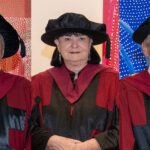A Perth palaeontologist will receive one of the prestigious Prime Minister’s Prizes for Science for her work in the preservation of fossilised soft tissue of ancient fish.
Dr Katherine Trinajstic’s work has found muscles and internal organs of ancient fish preserved along with fossilised bones, and has led to a series of discoveries including the oldest known fossilised vertebrates with soft tissue and discovery of the ‘first womb’.
Curtin University’s School of Science Research Fellow, Dr Trinajstic, who is also based at the Western Australian Museum, will be presented with the $50,000 Malcolm McIntosh Prize for Physical Scientist of the Year, by the Prime Minister and Minister for Innovation at the Prize Dinner in the Great Hall of Parliament House tonight.
The Malcolm McIntosh Prize for Physical Scientist of the Year recognises early career researchers who have made outstanding achievements in the physical sciences.
While working at the WA Museum on Gogo fish fossils preserved in limestone balls from the Kimberley Ranges in rocks more than 380 million years ago, Dr Trinajstic noticed what looked like muscle fibres between the bones.
“The normal procedure was to treat the fossil with acetic acid, which dissolved the surrounding rock, leaving only bones,” Dr Trinajstic said.
“However, I was determined to find a way to study the soft tissue preserved in these fossils without destroying them.”
Today, Dr Trinajstic uses synchrotron light and CT scanning to virtually dissect these ancient fossil fish.
Perhaps the biggest discovery was the ‘mother fish’ which had an umbilical cord still attached to its embryonic offspring.
“This revealed a vertebrate giving birth to live young some 200 million years earlier than was previously thought,” Dr Trinajstic said.
Curtin University’s Vice-Chancellor Professor Jeanette Hacket congratulated Dr Trinajstic on her work.
“We are delighted that our researchers are helping to further our understanding of how life on Earth has evolved,” Professor Hackett said.
Dr Trinajstic has been working with Gogo fish fossils from the WA Museum since 1995. WA Museum CEO, Alec Coles congratulated Dr Trinajstic on her prize, saying the ongoing work being carried out by a key group of palaeontologists had greatly advanced the knowledge of not only the State’s prehistory but also of the story of evolution.
“The work of scientists such as Dr Trinajstic is vital to our understanding of the world,” Mr Coles said.
“The WA Museum was responsible for finding and caring for the Gogo fish so it is wonderful to see it taking its place among the world’s most important fossils.”
Dr Trinajstic is also developing tools for the oil company Chevron to help it date core samples rapidly and accurately in its search for new oil and gas reserves.
Note to Editors:
The winners of the Prime Minister’s Prizes are:
- Dr John Shine, director of the Garvan Institute in Sydney, will receive the $300,000 Prime Minister’s Prize for Science for his science – discoveries of key gene sequences that led to cloned medicines – and his research leadership.
- Dr Katherine Trinajstic will receive the $50,000 Malcolm McIntosh Prize for Physical Scientist of the Year. This Perth palaeontologist from Curtin University is rewriting the story of the evolution of our deep ancestors and contributing to oil and gas exploration.
- Dr Benjamin Kile from Walter and Eliza Hall Institute in Sydney will receive the $50,000 Science Minister’s Prize for Life Scientist of the Year. His discoveries will extend the life of blood transfusion products and help explain how cancer starts.
- Dr Matthew McCloskey, director of studies at Sydney Grammar’s Edgecliff Preparatory School will receive the $50,000 Prime Minister’s Prize for Excellence in Science Teaching in Primary Schools for bringing real science experiments back into the classroom, building on his own experience as a research scientist and zoologist.
- Ms Debra Smith, head of science at Centenary High School in western Brisbane will receive the $50,000 Prime Minister’s Prize for Excellence in Science Teaching in Secondary Schools for inspiring thousands of students and helping to redefine the senior science curriculum in Queensland and across Australia.
Contacts:
Dr Kate Trinajstic,
Tel: 08 9266 2792; Mobile: 0419 198073, Email: k.trinajstic@curtin.edu.au
Teresa Belcher, Public Relations, Curtin University
Tel: 08 9266 9085, Mobile: 0401 103 755, Email: teresa.belcher@curtin.edu.au
Caroline Lacy, Manager Media and Communications, Western Australian Museum
Tel: 08 9212 3860; Mob: 0414 381761; Email: caroline.lacy@museum.wa.gov.au


